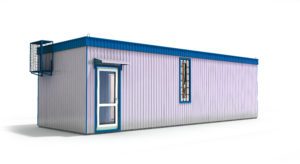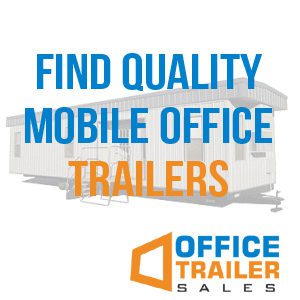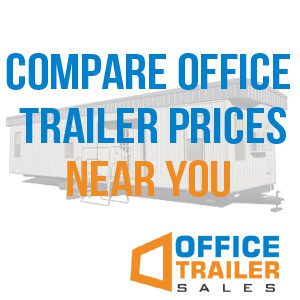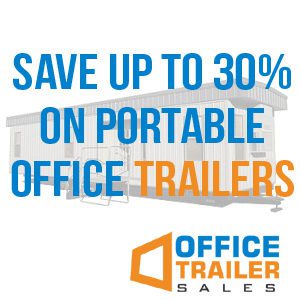
Office Trailers 101: A Step-by-Step Guide to the Rental Process
In today’s fast-paced business environment, flexibility and adaptability are key to staying competitive. Whether you’re managing a construction site, expanding your business, or dealing with temporary office space needs, office trailers provide an efficient and cost-effective solution. Renting an office trailer can offer the workspace you need without the long-term commitment of traditional office spaces. In this comprehensive guide, we’ll walk you through everything you need to know about renting office trailers, from understanding your needs to choosing the right provider and navigating the rental process.
What Are Office Trailers?
Office trailers, also known as mobile offices or portable offices, are prefabricated structures designed to provide temporary or semi-permanent office space. These trailers are typically built off-site and delivered to your location, where they can be quickly set up and used for a variety of purposes. Office trailers are popular in industries such as construction, education, healthcare, and event management, where temporary workspaces are often required.
Why Rent an Office Trailer?
Before diving into the rental process, it’s essential to understand why renting an office trailer might be the right choice for your business. Here are some key benefits:
Flexibility
One of the most significant advantages of office trailers is their flexibility. Whether you need additional office space for a few months or a couple of years, renting an office trailer allows you to scale up or down as needed. This flexibility is particularly valuable for businesses experiencing rapid growth or those managing projects with uncertain timelines.
Cost-Effectiveness
Renting an office trailer is often more cost-effective than constructing or leasing a traditional office space. You avoid the high upfront costs of building a permanent structure and the long-term commitments of a lease. Additionally, most rental agreements include maintenance and service, reducing your overall expenses.
Quick Setup
Time is money, and office trailers can be set up quickly to meet your needs. Once you’ve chosen a trailer and secured the necessary permits, the unit can often be delivered and installed within a few days. This rapid deployment is ideal for businesses that need to get up and running quickly.

Mobility
Office trailers are designed to be mobile, making them easy to relocate as your needs change. If your project moves to a new site or if your business expands to another location, your office trailer can move with you, providing continuous support without the hassle of finding new office space.
Customizability
Modern office trailers offer a range of customization options to meet your specific needs. From layout and size to interior finishes and amenities, you can tailor the trailer to suit your business’s requirements. Whether you need a basic workspace or a fully equipped office with meeting rooms, restrooms, and kitchenettes, there’s an office trailer configuration that fits.
Step 1: Assess Your Needs
The first step in renting an office trailer is assessing your specific needs. Understanding your requirements will help you choose the right trailer and ensure that the rental process goes smoothly. Here are some key factors to consider:
Size and Layout
Determine the amount of space you need and the layout that will best support your operations. Consider how many employees will use the trailer, the type of work being done, and any specific features you require, such as private offices, conference rooms, or restrooms.
Duration of Use
Consider how long you’ll need the office trailer. Rental agreements can range from a few months to several years, so it’s important to have a clear understanding of your timeline. If your needs are uncertain, look for rental providers that offer flexible terms.
Location and Accessibility
Where will the office trailer be located? Consider the size of the site, the terrain, and any access requirements. You’ll need to ensure that the trailer can be safely delivered and installed at your location. Additionally, think about utilities—will you need electricity, water, and sewage hookups?
Budget
Establish a budget for your office trailer rental. Keep in mind that costs can vary depending on the size, customization, and duration of the rental. Make sure to factor in delivery, installation, and any additional services you may require, such as maintenance or insurance.

Step 2: Research Providers
Once you’ve assessed your needs, the next step is to research office trailer rental providers. Choosing the right provider is crucial to ensuring a smooth rental experience. Here’s how to go about it:
Reputation and Reviews
Start by looking for providers with a strong reputation in the industry. Online reviews and testimonials can give you insight into the experiences of other customers. Look for providers that are known for their reliability, quality of products, and customer service.
Range of Options
Different providers offer different types of office trailers, so it’s essential to find one that offers the size and configuration you need. Some companies specialize in specific types of trailers, such as construction site offices, while others may offer a broader range of options. Make sure the provider you choose can meet your specific requirements.
Customization Capabilities
If you need a customized office trailer, look for providers that offer design and customization services. Some companies allow you to choose from a range of layouts, finishes, and features, while others may offer fully custom-built trailers to your specifications.
Delivery and Installation Services
Check if the provider offers delivery and installation services as part of the rental package. A full-service provider will handle transportation, site preparation, and setup, ensuring that your trailer is ready to use as soon as it arrives.
Support and Maintenance
Inquire about the level of support and maintenance provided during the rental period. Some providers offer comprehensive maintenance services, including regular inspections and repairs, while others may leave these responsibilities to you. Make sure you understand what’s included in the rental agreement.

Step 3: Choose the Right Office Trailer
With your needs assessed and a provider selected, it’s time to choose the right office trailer for your business. Here’s what to consider when making your selection:
Size and Layout
Choose a trailer that offers the right amount of space for your needs. Office trailers come in various sizes, typically ranging from 8’ x 20’ to 12’ x 60’. Consider how much space you’ll need for desks, equipment, and storage. If you have specific layout requirements, such as separate offices or a reception area, make sure the trailer’s configuration can accommodate them.
Common Office Trailer Sizes:
- 8’ x 20’: Ideal for small teams or as a single-office space.
- 10’ x 40’: Suitable for mid-sized teams or those needing multiple workstations.
- 12’ x 60’: Offers ample space for larger teams, meetings, and additional amenities.
Interior Features
Think about the interior features that are important for your operation. Do you need built-in desks, shelving, or cabinets? Would a kitchenette or restroom be beneficial? Some office trailers come with basic interiors, while others can be outfitted with a wide range of amenities. Make a list of must-have features and look for trailers that match your criteria.
Climate Control and Insulation
Depending on your location and the time of year, climate control and insulation may be essential. Look for trailers with heating, ventilation, and air conditioning (HVAC) systems to ensure a comfortable working environment. Additionally, if your trailer will be used in extreme weather conditions, make sure it’s well-insulated.
Accessibility
Consider accessibility features, especially if your trailer will be used by employees or visitors with mobility challenges. Look for trailers with ramps, wide doorways, and accessible restrooms if needed.

Step 4: Understand the Rental Agreement
Before finalizing your rental, it’s crucial to thoroughly review and understand the rental agreement. This document outlines the terms and conditions of your rental, including costs, responsibilities, and what to expect during the rental period.
Rental Duration and Costs
Make sure the rental agreement clearly states the duration of the rental and the total cost. Understand how the rental fee is structured—whether it’s a flat monthly rate, a daily rate, or a combination of both. Be aware of any additional fees, such as delivery charges, installation fees, or early termination penalties.
Maintenance and Repairs
Review the maintenance and repair responsibilities outlined in the agreement. Some providers offer full maintenance services, while others may require you to handle minor repairs or routine upkeep. Clarify who is responsible for maintaining the trailer and how repairs will be handled if they’re needed.
Insurance Requirements
Check the insurance requirements in the rental agreement. You may need to provide proof of insurance to cover the trailer during the rental period. If you don’t have the necessary coverage, ask the provider if they offer insurance options or can recommend a third-party provider.
Permits and Regulations
Make sure you understand any permits or regulatory requirements that apply to your office trailer. Depending on your location, you may need permits for the trailer’s installation, especially if it’s going to be used for an extended period. The rental provider may assist with obtaining permits, or you may need to handle this on your own.
Step 5: Delivery, Installation, and Setup
With the rental agreement signed, the next step is arranging for the delivery and installation of your office trailer. Here’s what to expect during this process:
Site Preparation
Before the trailer is delivered, ensure the site is properly prepared. This may involve leveling the ground, clearing debris, and setting up utility connections (if required). Your rental provider may offer site preparation services or provide guidance on what needs to be done.
Delivery and Installation
The rental provider will coordinate the delivery of the office trailer to your location. Depending on the size and complexity of the trailer, this may involve transporting the unit by truck and using specialized equipment to position it on-site. Once the trailer is in place, the provider will handle installation, including securing the trailer, connecting utilities, and ensuring it’s ready for use.
Final Inspection and Setup
After installation, conduct a final inspection of the trailer to ensure everything is in order. Check that all utilities are connected, interior features are functioning, and the trailer meets your specifications. Once you’re satisfied, you can begin setting up your office space with furniture, equipment, and supplies.

Step 6: Managing the Rental Period
During the rental period, it’s important to manage the office trailer effectively to ensure a smooth experience. Here are some tips for managing your rental:
Regular Maintenance
If your rental agreement includes maintenance services, schedule regular inspections with the provider to keep the trailer in good condition. If you’re responsible for maintenance, develop a routine for checking HVAC systems, plumbing, and other essential features to prevent issues.
Communicate with the Provider
Maintain open communication with your rental provider throughout the rental period. If you encounter any problems or need to make changes to your rental agreement, reach out to the provider as soon as possible. Prompt communication can help resolve issues quickly and prevent disruptions to your operations.
Plan for the End of the Rental Period
As the end of your rental period approaches, plan for the return of the office trailer. This may involve coordinating with the provider for pickup, ensuring the trailer is in good condition, and settling any final payments or paperwork.
Renting an office trailer is a practical solution for businesses that need flexible, cost-effective workspace. By following this step-by-step guide, you can navigate the rental process with confidence, from assessing your needs to managing the rental period. Whether you’re supporting a construction project, expanding your business, or need temporary office space, office trailers provide the versatility and convenience you need to keep your operations running smoothly.

Leave a Reply